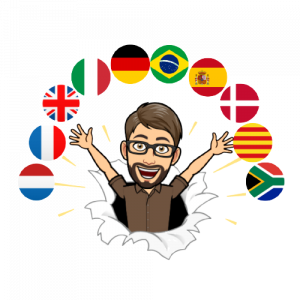
The other day somebody in one of the language groups on Facebook that I am member of asked, “What are some of the methods you use to learn a language?”.
Well, here is my very very very short answer in 🇬🇧 and 🇮🇹, adapted to the Instagram Reel reality of 30 seconds. Enjoy the video(s) or you can also continue reading under them.
Get ready for me on an English High Speed Train and/or an Italian Frecciarossa.
⭐ Music. A lot of music.
⭐ Singing along with the songs of The Lion King in every language I know. These songs are usually the first ones I turn to when I start a new language.
⭐ Reading Le Petit Prince in every language I study. Every time I read it, I discover something new.
⭐ Rereading books I really like in my new language(s): Angels and Demons, A Thousand Splendid Suns, Crusade in Jeans, …. To name only a few.
⭐ This might sound strange, but it really works and definitely underrated as a language learning tool: I talk to myself while taking our dogs for a walk. But you could also do while showering or brushing your teeth.
⭐ Listening to Podcasts, whenever possible: while running, while cleaning, while cooking, while gardening (but I keep some time for meditation; my mind does need a break every day at least twice).
⭐ Making mistakes (and trying to ignore the fear of sounding ridiculous).
⭐ Writing on Twitter in my target languages and hoping someone wants to check for those mistakes. In my experience, even if nobody gives feedback (but usually I get some), it is a good practice to add some writing and/or speaking to your language learning. It forces you to focus on sentence structure, you have to look up words you didn’t know and if you make a voice note or video you might have to check the pronunciation of some words (using for example Forvo.com).
⭐ Classes on Italki with great teachers. Don’t go for good, go for the best for you. Keep in mind that we’re all different and unique and a great teacher for your friend (with or without benefits) might be not your cup of tea.
⭐ Participating in language challenges as they force you to focus a bit more on your language(s) during a certain amount of time.


